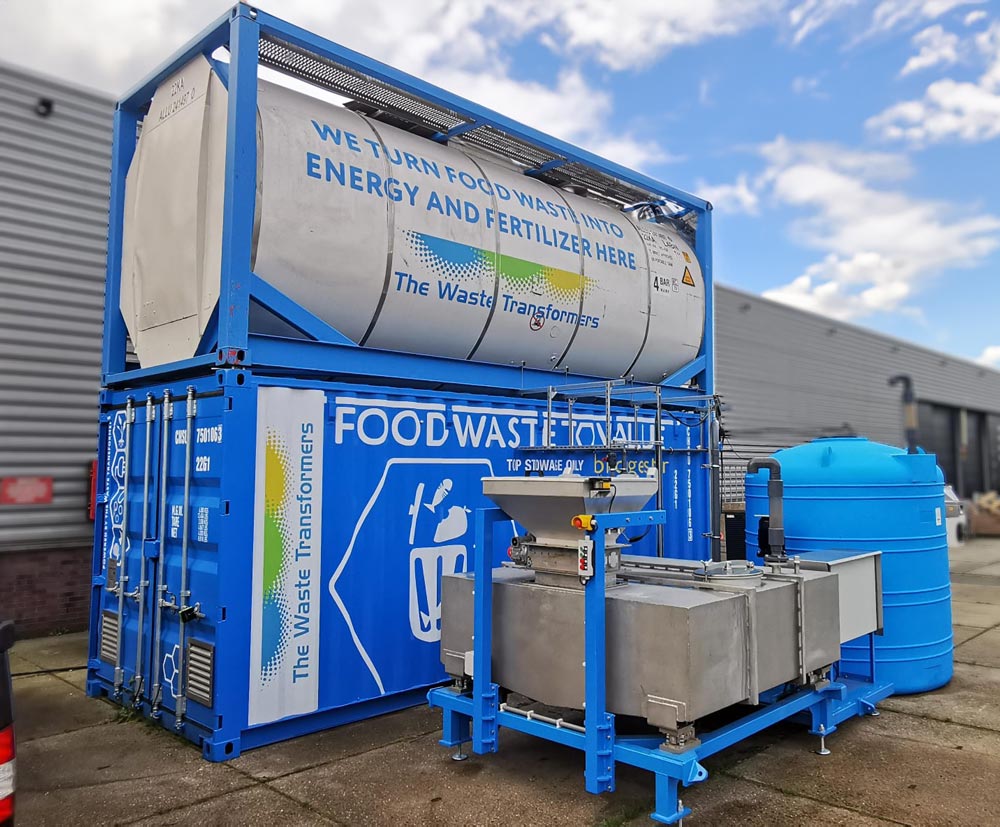
1. Achieve carbon reduction goals and support climate action
Food waste contributes to 8-10% of global greenhouse gas emissions, a staggering figure that underscores the environmental cost of inaction. Valorizing food waste allows businesses to convert it into renewable energy and reduce methane emissions from landfills. By addressing this critical issue, your organization not only lowers its carbon footprint but also takes a tangible step toward meeting global climate commitments.

2. Reduce operational costs through smarter food waste management
Disposing of food waste in landfills incurs significant costs, from transportation to landfill taxes. On-site food waste solutions, as on-site urban biodigesters, eliminate these expenses while providing added value in the form of renewable energy, organic fertilizers, and tangible action visible towards your stakeholders. Reducing waste disposal costs improves operational efficiency, contributing directly to your bottom line.
3. Unlock new revenue streams and resource efficiency
Food waste valorization turns a liability into an asset. Renewable energy generated from food waste can offset energy costs or be sold back to the grid, while organic fertilizers create additional revenue opportunities. By reducing a companies environmental impact, a tangible Waste Transformer biodigester can be the leading example of climate action in your sustainability reports. This approach transforms food waste into holistic resources that drives the sustainability agenda, aligning sustainability efforts with profitability and proof.

4. Strengthen brand reputation and respond to consumer demand
Today’s consumers and stakeholders expect companies to take visible and meaningful action on sustainability, and preferably today instead of tomorrow. By implementing on-site food waste valorization solutions, your business demonstrates leadership in addressing environmental challenges. This enhances brand reputation, strengthens stakeholder trust, and appeals to eco-conscious customers, creating long-term loyalty and market differentiation.
5. Build resilience against regulatory pressures
Governments worldwide are tightening regulations around food waste management and emissions. Companies that proactively adopt sustainable practices will be better equipped to comply with evolving policies, avoiding fines and operational disruptions. Valorizing food waste positions your organization as a sustainability leader, prepared to navigate regulatory challenges with ease. From March 2025 businesses in the UK need to separate all their food waste.
6. Align with the circular economy for long-term growth
The shift toward a circular economy presents a strategic opportunity for businesses to innovate and future-proof their operations. By transforming food waste into renewable energy and fertilizers, your company reduces dependence on finite resources and contributes to a regenerative system. This approach not only enhances resource efficiency but also positions your business for long-term growth in a sustainability-driven economy.
Transforming challenges into opportunities
For C-level leaders, food waste valorization isn’t just an operational adjustment—it’s a strategic decision with far-reaching benefits. From reducing costs to enhancing reputation and building resilience, addressing food waste unlocks value across multiple dimensions.
At The Waste Transformers, we specialize in helping businesses harness the power of food waste. Our on-site biodigesters provide a scalable, practical solution to turn food waste into strategic business value, enabling your business to lead in sustainability while gaining organisational rewards.
It’s time to see food waste not as a challenge but as an opportunity—a way to create strategic value, drive innovation, and lead the transition to a sustainable future.
About The Waste Transformers: The Waste Transformers is a Dutch cleantech pioneer, providing on-site innovative technologies to transform unavoidable food waste into sustainable energy and natural fertilisers, enabling local positive change.

